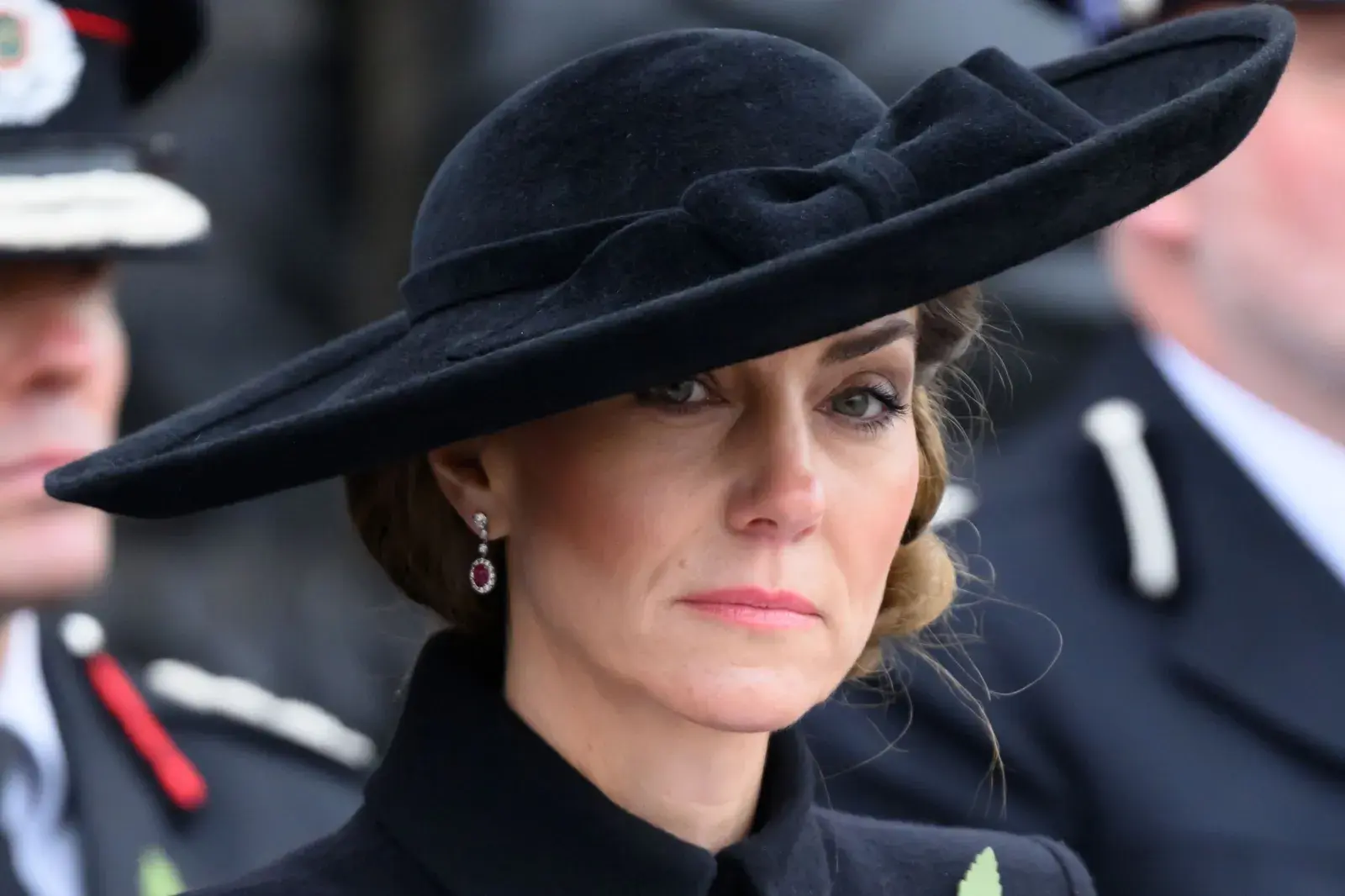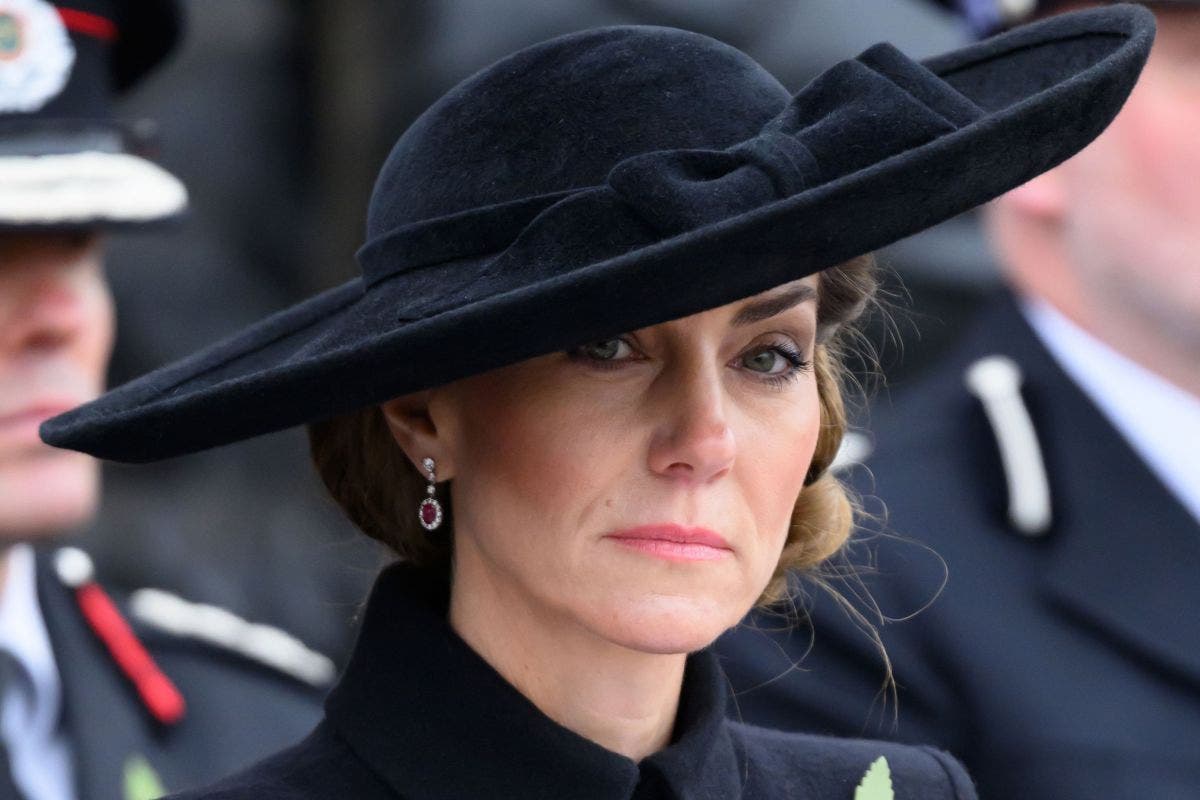The BBC News website changed a headline that referred to the Princess of Wales as “Kate” in the midst of a backlash over a presenter who referred to “Kate Middleton” during live coverage on Veterans Day.
Many media organizations refer to the likely future queen as “Kate Middleton,” including Newsweek up until 2024, however, she is technically Catherine, Princess of Wales. Newsweek’s house style is currently “Princess Kate,” and simply “Kate” for subsequent mentions.
Author Adrian Hilton posted a screengrab on X of a BBC News story showing the headline: “Kate and Queen lay Armistice Day wreaths as nation pays tribute.”
Hilton wrote: “Correct me if I’m wrong, but I don’t recall the BBC referring to ‘Diana Spencer’ after her wedding, or writing headlines like ‘Di and Queen’. The tabloids did, certainly.
“But it’s even more disrespectful from BBC News because she uses ‘Catherine,’ and I thought the BBC now valued preeminently how people wish to self-identify.”
The BBC later changed the headline to read: “Catherine and Queen lay Armistice Day wreaths as nation pays tribute.”

The princess has never publicly stated any opinion on whether she considers the shortened form of her name disrespectful. In fact, Prince William has referred to her as “Kate” in her presence on camera, including in their engagement interview in 2010. These days, however, William does mostly use “Catherine.”
The saga came in the middle of a wider backlash against the BBC after a presenter referred to the princess in live coverage as “Kate Middleton,” her name before she married.
Why It Matters
The BBC is under fire at the moment after the resignation of two senior staff, director general Tim Davie and head of news Deborah Turness, over a dispute about the editing of President Donald Trump’s comments ahead of the January 6, 2021, attack on the U.S. Capitol.
As allegations of left-wing bias swirled, royal fans picked up on a passage in the live coverage of Britain’s ceremonies on Armistice Day, the U.K. equivalent of Veterans Day.
Backlash Over BBC Reference to Kate Middleton
Hilton posted a clip on X and wrote: “Just BBC News on #ArmisticeDay casually announcing the arrival of ‘Kate Middleton’.”
The post was liked 2,100 times and viewed 591,000 times and showed the presenter saying: “We’ll take you to the arboretum in Staffordshire, as we said there, Kate Middleton attending that ceremony. Let’s have a listen in.”
Hilton followed up with another post reading: “A minor thing, of course. I doubt many noticed, and I’m sure even fewer were offended.
“But there will be BBC guidelines on forms of address, which were just summarily and heedlessly discarded to do to the Princess of Wales what the tabloid press habitually does to her (and they may now officially do to Andrew).
“The journalist may herself be a republican, and may not respect the Royal Family. But when you speak for the state broadcaster you speak to the nation, for the nation. One expects better from the BBC.”
The post not only went viral, but sparked a wave of headlines in the British press, including from news organizations that have referred to “Kate Middleton” many times themselves.
Jim Shannon, a member of parliament for Northern Ireland’s Democratic Union Party, wrote on X: “A reminder to BBC News to educate its broadcasters that the Princess of Wales has not been ‘Kate Middleton’ since 2011. Her correct title is Catherine, Princess of Wales. Get it right.”
And broadcaster Kirstie Allsopp wrote: “This one of my bug bears, it is Catherine, the Middleton bit is just b***** rude, but most of all it is Catherine. HRH The Princess of Wales actually, and if that kills you, it’s Catherine Wales.”
Kate Middleton vs Catherine, Princess of Wales
The BBC is better than most in referring to Kate as “Catherine, Princess of Wales,” but it is also held to a higher standard than other news organizations precisely because it is Britain’s state broadcaster, and funded by a license fee that U.K. residents with a TV have to pay by law. And it does also regularly refer to her as “Kate.”
As Newsweek explored in detail before, naming Kate has been a surprisingly tricky subject in part due to the rise of Search Engine Optimization, the practice of tailoring website headlines and copy to the demands of online search platforms.
Google Trends data shows that even in Britain searches for “Kate Middleton” far outstrip searches even for “Princess Kate” let alone for the more official “Catherine, Princess of Wales.”
On October 31, for example, “Kate Middleton” made up 56 percent of Google searches about the royal, while “Princess Kate” made up 15 percent and “Catherine, Princess of Wales,” made up 3 percent. And that is after most British news outlets switched to calling her “Princess Kate.”
The Rise of Princess Kate
The question of how to name Kate has become political. Supporters of the princess have always been frustrated at the use of “Kate Middleton,” but U.K. outlets persisted in using it even after the death of Queen Elizabeth II, at which point she was upgraded from Duchess of Cambridge to Princess of Wales.
That all changed in 2024 after Kate had abdominal surgery leading to time out of the public eye. Kensington Palace prepared the public for the fact she would not be doing royal duties, but questions—and conspiracy theories—began to emerge about why there had been no post-op images of her.
A trend began on social media asking, “Where is Kate Middleton?” and all the while she was secretly undergoing chemotherapy for cancer, which had been discovered during what was supposed to be a treatment for a non-cancerous condition. The palace did not publicize the new diagnosis and posts falsely suggested the princess’ secret death was being hidden from the world went viral.
U.K. outlets took Kate’s side against the forces of social media and pivoted away from using “Kate Middleton” to signal they were not part of the pile-on the princess was facing.
Strictly speaking, a purist would say that “Princess Kate” is also wrong. Officially, she is “Catherine, Princess of Wales.” Some fans go as far as arguing she has never been called “Kate” and that the nickname was an invention of the British tabloids, though William has referred to her as Kate in the past, including numerous times during their engagement interview.
“I would say I’m getting better at cooking,” William told ITV’s Tom Bradby, “Kate would say I’m getting a lot worse.”
Prince Harry also calls her “Kate” in his book Spare, though that may be slim comfort to her supporters given the rift between the Sussexes and the Waleses.
The official styling, however, is 28 characters long and the Google search results show just the first 55 characters of a headline meaning any outlet referring to Kate that way would have little space left to explain the actual story.
Hence, even the media organizations who actively tried to court Kate’s fan base have still ultimately been left referring to her by a name that riles some.
Comparisons to Princess Diana
While Hilton may be correct about the BBC not using Diana Spencer after her marriage—which no news outlets did—or abbreviating Diana to “Di,” which was a popular nickname with the tabloids, the BBC did simplify her name compared to the official version.
Even after her death, the BBC referred to her simply as “Diana” numerous times, for example in the online headlines “Diana claims ‘cruel and spiteful'” and “Princes say let Diana rest” in 1998.
In short, media organizations—including the BBC—have always struggled to use the full, official versions of royal titles consistently because they are unwieldy. And to do so would also separate those news organizations from the overwhelming majority of their readers who do not use the official form in their everyday speech.
A Backlash Over Donald Trump
The timing of the argument is awkward though for the BBC, which is currently gripped by allegations of left-wing bias.
The two high-profile resignations were over a BBC Panorama documentary that stitched together different remarks made by the president on January 6, 2021, in the lead-up to the attack on the U.S. Capitol.
Some have argued there is an institutional left-wing bias in the BBC while former staff like Lewis Goodall, now a co-host of The News Agents podcast, have said that in terms of the pressure put on reporters by management the opposite was true.
Either way, a viral social media backlash over how to describe Britain’s probable future queen, loved by conservatives across the country, was the last thing the corporation needed adding to its woes.
Do you have a question about Charles and Queen Camilla, William and Kate, Meghan Markle and Harry, or their family that you would like our experienced royal correspondents to answer? Email royals@newsweek.com. We’d love to hear from you.
